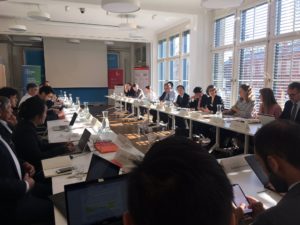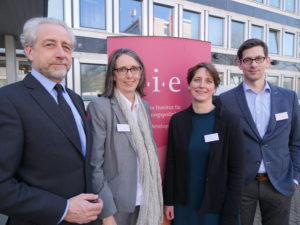Together with GIZ’s Governance Cluster in Morocco, Annabelle Houdret (DIE) organized a workshop in Rabat on 22 February . She introduced the concept of a new social contract and showed how it can be used as a tool for analysis and planning in development cooperation. Prof. Kamal ElMesbahi, a Moroccan economist (Transparency Maroc), then analyzed Morocco’s main governance problems and potential windows of opportunity for development cooperation. On the basis of these presentations, the GIZ staff members discussed how their work could better contribute to support the Moroccan society and government in negotiating a new, more inclusive social contract.
Since 2015, DIE’s regional research team explores the concept of a new social contract within its project ‘Stability and Development for the Middle East and North Africa’. In addition to their scientific work, they also support BMZ and its implementing agencies in using this approach for strategic planning and in project implementation.
 On 20 March 2019, experts from policy and academia met in Berlin to discuss how to strengthen the role of the G20 as a supporter of an ambitious climate and sustainability policy. The expert conference „Fit for purpose? Revitalizing climate and sustainability issues in the G20 process“ was organized by DIE together with the Institute for Global Environmental Strategies (IGES, Tokyo), the Mercator Research Institute on Global Commons and Climate Change (MCC, Berlin) and the Sustainable Development Solutions Network (SDSN). The conference was part of the T20 process during the Japanese G20 presidency and provided a platform for trustful exchanges between representatives of various G20 work streams and T20 Task Forces.
On 20 March 2019, experts from policy and academia met in Berlin to discuss how to strengthen the role of the G20 as a supporter of an ambitious climate and sustainability policy. The expert conference „Fit for purpose? Revitalizing climate and sustainability issues in the G20 process“ was organized by DIE together with the Institute for Global Environmental Strategies (IGES, Tokyo), the Mercator Research Institute on Global Commons and Climate Change (MCC, Berlin) and the Sustainable Development Solutions Network (SDSN). The conference was part of the T20 process during the Japanese G20 presidency and provided a platform for trustful exchanges between representatives of various G20 work streams and T20 Task Forces.
